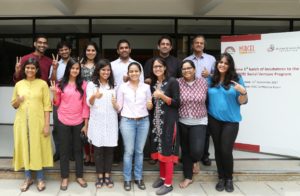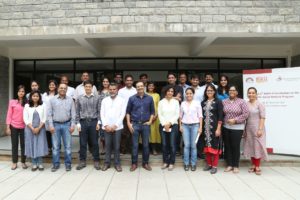Anchor-mentors will guide the start-ups through their 18-month incubation journey at the NS Raghavan Centre for Entrepreneurial Learning
18 September, 2017, Bengaluru: The eight early-stage organizations selected by IIM Bangalore’s N. S. Raghavan Centre for Entrepreneurial Learning (NSRCEL), under the social ventures program for incubation over the next 18 months, were inducted on September 15 (Friday), 2017, in the presence of IIMB faculty, mentors and NSRCEL members.
Rajiv Sawhney, Chief Operating Officer, NSRCEL, said: “A review system will be in place for periodic intervention to monitor your progress. We need to get into a far more frequent Q&A mode. There will be many speaker sessions and workshops to engage you in high gear. Access to online platforms will help boost interaction with a larger community. To make you successful is our own test as well.”
The entrepreneurship and innovation hub of IIM Bangalore – NSRCEL – had launched its social ventures incubator in April this year, to nurture early stage non-profit organizations.
Through this initiative, NSRCEL Social aims to address the lack of an effective support system for early stage NGOs that are offered little or no technical assistance for fund raising, legal issues and operational challenges. One of the first social incubators of India exclusively for non-profit organizations, it aims to help create a pool of high-performing organizations that can create large-scale social impact. The social ventures incubation program is currently supported by the Michael & Susan Dell Foundation. These selected ventures will be incubated for a period of 18 months and given financial support of INR 18 lakhs.
The goal of the NSRCEL Social Ventures Program is to help the ventures build a mindset to scale and impact. NSRCEL will put in place an M&E framework to periodically track progress of the ventures through joint goal setting efforts ofmentors and ventures and enable a three pronged mechanism of self, peer to peer and mentor review system in place. NSRCEL also intends to foster cross learnings and sharing of best practices through the mix of programs and other incubatees under its fold.
The selection process for the program started early April this year. The centre received over 160 applications, out of which 24 were selected spanning diverse sectors like education, livelihood, financial inclusion, etc. The 12-week pre-incubation program for these ventures included mentoring, classroom sessions on critical strategies, field visits, boot camp, networking and intensive review sessions.
Shortlisted ventures were pitched to an advisory committee before the final eight were selected. The incubation will give the ventures access to resources at IIMB and leverage the support system created for non-profits. The incubator is guided by an eight-member advisory committee comprising established non-profit and business leaders and faculty of IIMB. It leverages the expertise of NSRCEL-IIMB in nurturing for-profit organizations for over a decade, faculty members and student communities at IIMB.
The induction event, on September 15, was organized for the very first batch of incubatees. All the ventures have been assigned an anchor-mentor who will guide them throughout the program. The incubatees will also have access to the large pool of industry experts, IIMB faculty, alumni and resources at NSRCEL during the program.
Other than the agreements and documentation formalities, the day’s activities included walking the ventures through the incubation plan brief, designating anchor mentors, followed by a goal-setting workshop that will facilitate the formulation of the M&E framework to track their progress.
Professor Sourav Mukherji, Dean of Academic Programmes at IIMB and one of the mentors, congratulated the incubatees for having taken up, what he described as, ‘the bold and difficult journey of entrepreneurship’. “Being a social entrepreneur is even tougher. There has to be internal balance between social impact and financial sustainability. However, no learning or experience is great unless it is difficult!”
Prof. Mukherji’s advice of maintaining this balance was echoed by the mentors as well. They advised the incubatees to be rooted in reality while trying to think beyond the norm, take risks, disrupt, and identify and solve difficult problems.
Details of the selected ventures and anchor-mentor profiles
Selected Ventures
1. i-Saksham: Founded by ex-Gandhi fellows Ravi Dhanuka, Aditya Tyagi and Shravan Jha, it aims to enhance learning outcomes by training community youth educators using technology as the main facilitator. It enables these educators to run their own learning centres and meaningfully engage in various other educational activities.
2. Meraki: Brainchild of Seemant Dadwal and Co-founder Ghajal Gulati, it offers solutions for intergenerational burdens that disadvantaged families carry, by equipping parents with knowledge skills and mindset to be able to transform their children’s lives.
3. Mantra4change: It works through school transformation. Khushboo and Santosh, founders of Mantra4Change, explain that through an intensive two-year partnership with schools, Mantra4Change aims to transform the aspects of instructional leadership, teaching-learning processes and the school culture.
4. Tarkeybein Education Foundation (TEF): It develops English language learning tools and training programs for students and teachers. Learning tools are being co-created with children from low-income groups. The core focus is on children building skills of observation, interpretation and expression, and acquiring English language skills in this learning process.
5. Superheros Incorporated: It aims to develop success-oriented mindset and career readiness, along with strengthening technical skills in vocational trainees, in order to provide industries with skilled workforce. Operating through various programs designed for the students at ITIs, it aims to bridge the gap between the supply and demand of the skilled and trained workforce with enhanced employability.
6. Guardians of Dream: It is working towards building an anchor institution to define and consolidate the childcare sector. It is also working to solve critical gaps in research, intervention design, implementation capacity and resource mobilization. In the initial phase, Guardians aims to create and deliver interventions within an institutional framework (children’s homes and orphanages).
7. Bridges of Sports: Founded by Nitish M Chiniwar, it works with children from economically and socially backward communities in the age group of 8-14 years. A network of high quality volunteers, athletes and teachers dedicate two years of their life to the fellowship program and post fellowship, Bridges of Sports supports the fellows to become micro entrepreneurs with a focus on building and accelerating the vibrant sports ecosystem.
8. Anthills Creations: At Anthills Creations, Pooja Rai and Nancy Charaya, alumnus of IIT Kharagpur, are determined to bring back play for kids through building sustainable playscapes by using recyclable material.
Profile of Mentors
1. Professor Sourav Mukherji is the Dean of Academic Programmes at IIMB. Professor Mukherji teaches postgraduate courses on Organization Design and Inclusive Business Models. His current research focus is on inclusive business models – businesses that address the needs of the poor in a financially sustainable manner. In this domain, he has authored many case studies, several of which have been published online by the Harvard Business Press. He has been a consultant to organizations in the public, private and not-for-profit sectors, advising them on organization design and financial sustainability.
2. Samina Bano: Founder RightWalk, where she is building an inclusive and accountable education system, opening up access for children to an equitable education irrespective of socio-economic status. To do this Samina is building a movement of students, parents, teachers, school administrators, and government officials who are demanding an inclusive education system through policy and implementing it through accountability mechanisms.
3. Rajesh Navaneetham: Rajesh is a Founder-partner in Katalytics Growth Consultants. He works with organizations to help them scale up their operations in India. In doing this, he brings his practical knowledge of more than two decades in the corporate world, where he has successfully set up / scaled up engineering teams and businesses in India.
4. Dipesh Sutariya: Dipesh Sutariya is the Co-founder and CEO of Enable India, a non-profit organization that has been working for the economic independence and dignity of persons with disability across India, since 1999. Dipesh is transforming attitudes towards the employment of people with disability through a growing group of professionals with disability who meet the needs of the corporate sector and who dispel the myths and stereotypes about hiring persons with disability.
5. Rajiv Kuchhal Rajiv is an active angel investor and mentor to multiple start-ups in the social enterprise and technology space. He is an advisor and board member of many such companies and a general partner at Exfinity fund.
6. Naghnma Mulla: Naghma works towards creating and maintaining a sustainable philanthropy network to support the EdelGive investee portfolio with the funder community. She is responsible for and heads the three divisions at EdelGive, namely Investment and Programmes, Fundraising and Partnerships, and Employee Engagement Programme.
7. Naga Prakasam: Nagaraja (Naga) Prakasam is a full-time angel investor who has invested in 16 start-ups and seen three exits. He has spearheaded Impact thinking in Indian Angel Network and co-founded IANImpact. A partner at Acumen Fund, a New York based $100M impact-venture fund, he serves as an Independent Director in one of its portfolio companies. In addition, he directs boards in Uniphore Software Systems, GoCoop – Social Marketplace, Saahas Zero Waste, FreshWorld, Lumiere Organic, SP ROBOTIC WORKS Pvt. Ltd and is a board observer at Happy Hens Farm.
Photo Gallery:

IIMB’s incubation and innovation hub – the NS Raghavan Centre for Entrepreneurial Learning (NSRCEL) – welcomes the first ever batch of eight social ventures to the NSRCEL Social Program on September 15, 2017.

Anchor-mentors and incubatees of NSRCEL Social at the Induction Program.
Visit @ IIM Bangalore
